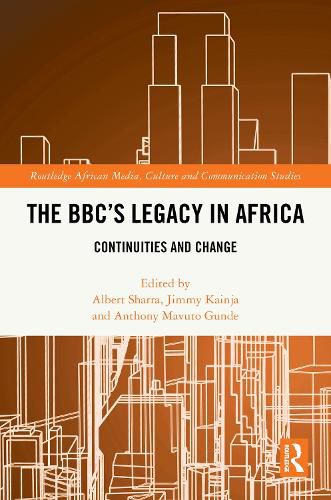Readings Newsletter
Become a Readings Member to make your shopping experience even easier.
Sign in or sign up for free!
You’re not far away from qualifying for FREE standard shipping within Australia
You’ve qualified for FREE standard shipping within Australia
The cart is loading…






This book critically examines the historical and ongoing influence of the British Broadcasting Corporation (BBC) on African broadcasting, tracing its colonial roots through to its post-colonial legacy.
The book details how in the 1930s the BBC established radio transmitter sites in East and Central Africa, thereby positioning itself as a model for broadcasting in British colonies and beyond. Grounded in a decolonial perspective, the book then explores the evolution of African radio structures, funding models, editorial policies and programming strategies. In the post-colonial era, the BBC continued to train, equip and support African broadcasters while maintaining a strong presence through African-focused programming. Some nations fully embraced the BBC model, while others developed hybrid broadcasting systems integrating British, local and transnational influences. Beyond historical analysis, the book interrogates the BBC's enduring influence on African media, examining how contemporary local broadcasters negotiate, adapt or resist its legacy. A nuanced exploration of these dynamics provides critical insights into the intersection of colonial-era institutions and contemporary African media landscapes.
This book is an essential resource for scholars and researchers in media and communication studies, African studies and decolonial studies, offering a comprehensive understanding of the BBC's role in shaping African broadcasting.
$9.00 standard shipping within Australia
FREE standard shipping within Australia for orders over $100.00
Express & International shipping calculated at checkout
This book critically examines the historical and ongoing influence of the British Broadcasting Corporation (BBC) on African broadcasting, tracing its colonial roots through to its post-colonial legacy.
The book details how in the 1930s the BBC established radio transmitter sites in East and Central Africa, thereby positioning itself as a model for broadcasting in British colonies and beyond. Grounded in a decolonial perspective, the book then explores the evolution of African radio structures, funding models, editorial policies and programming strategies. In the post-colonial era, the BBC continued to train, equip and support African broadcasters while maintaining a strong presence through African-focused programming. Some nations fully embraced the BBC model, while others developed hybrid broadcasting systems integrating British, local and transnational influences. Beyond historical analysis, the book interrogates the BBC's enduring influence on African media, examining how contemporary local broadcasters negotiate, adapt or resist its legacy. A nuanced exploration of these dynamics provides critical insights into the intersection of colonial-era institutions and contemporary African media landscapes.
This book is an essential resource for scholars and researchers in media and communication studies, African studies and decolonial studies, offering a comprehensive understanding of the BBC's role in shaping African broadcasting.